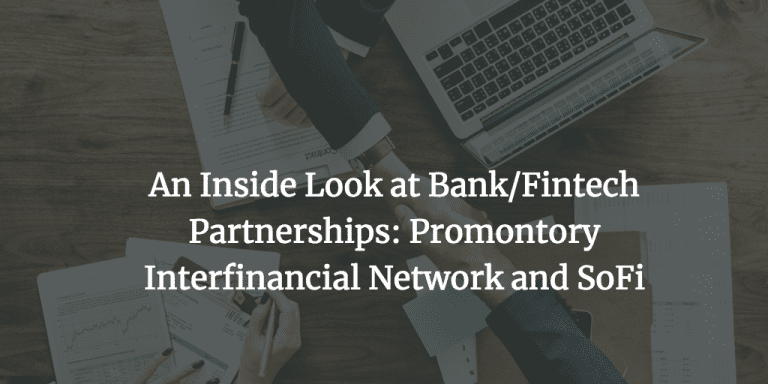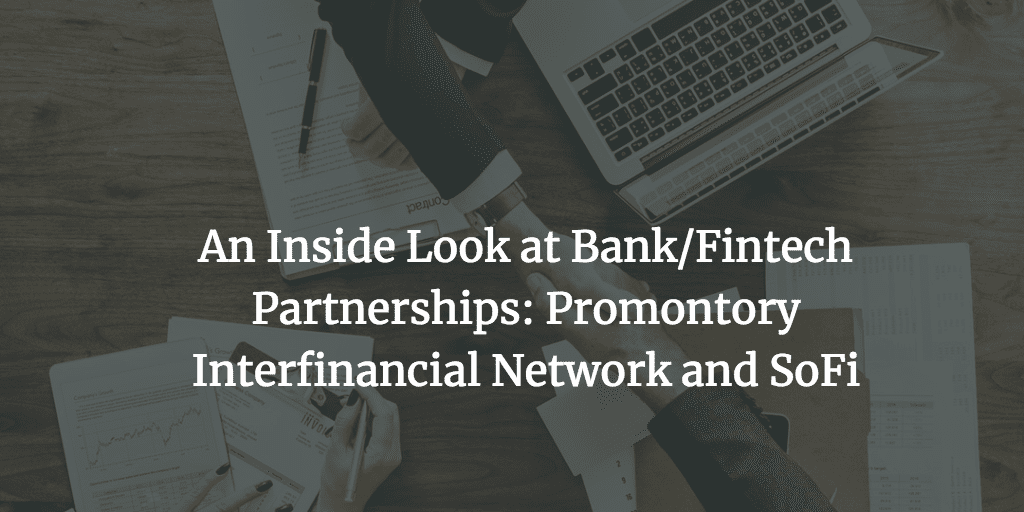The recent surge in financial innovation has caused many community banks to rethink how they are serving their customers and what they can do to improve that experience. I recently spoke with two community banks about their decision to buy SoFi loans using Promontory Interfinancial Network’s service.
I spoke with Brian Plum, CEO of Blue Ridge Bank, which is a Virginia based community bank with mortgage offices in North Carolina, and Nicole Austin, Chief Lending Officer of Pioneer Bank, which is a New Mexico-based community bank.
Both banks had experience in looking at fintech partnerships before moving ahead with their decision on the SoFi program. They both said that as lending and banking changed, they needed to better understand how new technology could help their businesses.
Blue Ridge Bank had previously partnered with Long Game Savings on the deposit side, and Pioneer Bank had visited with commercial lending fintechs.
Promontory Interfinancial Network helps thousands of banks with innovative balance sheet management solutions, including a service that helps connect buyers and sellers of performing loans on the secondary market. In February 2017, it struck an arrangement with SoFi through which community banks can purchase SoFi’s student and personal loans. The program intends to leverage the benefits of scale for both individual banks and SoFi.
“SoFi enables community banks to efficiently access high quality loans and diversify their loan portfolios,” said Mark Jacobsen, Promontory Interfinancial Network’s President and CEO. “We were attracted to SoFi because of its success in reaching its target borrower profile, which banks find difficult to reach themselves.”
Blue Ridge Bank and Pioneer Bank took the opportunity and ran with it, but not before conducting their own due diligence to help their respective boards become comfortable with the program.
When asked if the program was a success Mr. Plum said, “Absolutely. We acquired a portfolio item that offers a nice yield, short duration, and attractive quality metrics, all without the administrative and organizational efforts associated with trying to create it ourselves.”
Taking part is such partnerships allows smaller banks without endless resources the ability to diversify and gain access to an asset that they might otherwise miss.
There is the question of whether community banks view fintech companies as a threat or complement to their business. Ms. Austin explains Pioneer’s viewpoint, “we are figuring out that we have to make them a complementary part of our business. In some ways, there will always be a need for brick and mortar banks. However, more and more consumers want to have lending processes that are as seamless and online as possible. Pioneer Bank is centered in relatively rural areas; therefore, lending opportunities are limited. If we want to continue to grow, we must look outside of the traditional banking box. Entities such as SoFi allow us to do that.”
Both banks went on to say they think this type of partnership reaffirms the need to look at fintech firms for other opportunities. Bank and fintech partnerships have been growing in recent years as both sides now believe there is more to gain by partnering than competing.
“Sixteen years ago when we founded Promontory Interfinancial Network, we recognized bank-fintech collaboration is a trend likely to grow over time and one that can benefit both,” said Mr. Jacobsen when asked about the broader trend in partnerships.
Partnerships do bring up the issue of security which is a big concern for both banks. The banks have poured more time, financial resources, and staff into combatting cyber based threats. The trend of open banking has only increased those security concerns. As customers look to gain greater control of their data, banks like Blue Ridge and Pioneer are exploring how much more is needed to protect the banks and their customers.
Pioneer has started to explore use of biometrics as an added security measure, “any way to make security better, is a win for banks,” explained Ms. Austin.
Mr. Plum of Blue Ridge Bank believes blockchain technology and artificial intelligence will transform the way financial services companies operate. He goes on to say, “It is an incredibly exciting time to be in the industry. I think bankers that wake up every day scared to death that they’ll be left behind will, as a group, outperform the ones convinced that all of the talk of imminent major change is a sideshow.”
Community banks have to be more strategic when it comes to building, buying or partnering when it comes to technology. Programs like the one from Promontory Interfinancial Network’s Bank Assetpoint service allow these banks to take advantage of an opportunity without typically having to devote significant new resources to the opportunity. Bank and fintech partnerships will only continue to grow as financial services becomes fully digital.



